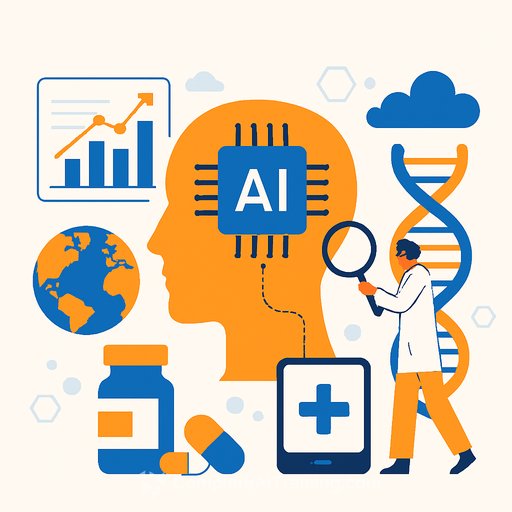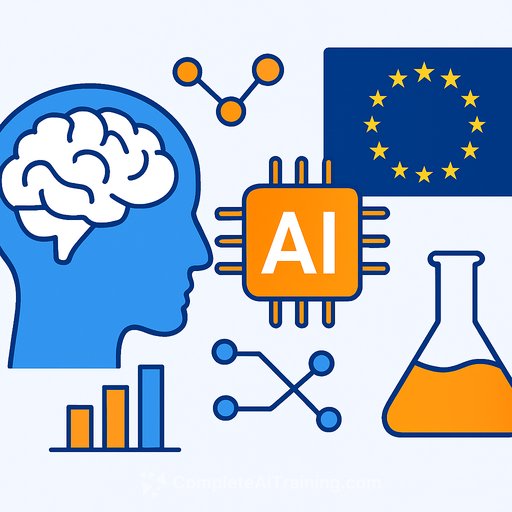AI in Life Science Analytics Market Set to Reach $3.6 Billion by 2030
The global AI in Life Science Analytics Market is on a strong growth path, expected to grow from $1.9 billion in 2024 to $3.6 billion by 2030, with a compound annual growth rate (CAGR) of 10.9%. This expansion is driven by advances in AI and machine learning combined with increased healthcare spending.
AI Advancing Diagnostics, Real-World Evidence, and Personalized Healthcare
AI's expanding role in diagnostics and patient monitoring is a key growth factor. AI-powered diagnostic tools improve accuracy and speed, enabling early detection of diseases like cancer and neurological disorders. These tools generate large datasets that life science analytics platforms use to extract actionable insights.
By processing diverse data types such as imaging and genomic information, AI supports predictive modeling of patient outcomes and treatment optimization. This contributes to generating real-world evidence, which is increasingly demanded by regulatory authorities for drug approvals and post-market surveillance.
Integrating AI-driven real-world data analytics allows healthcare providers to personalize treatments and improve patient adherence by tailoring interventions to individual risk profiles. This synergy between AI diagnostics and life science analytics enhances healthcare delivery and fuels market growth.
AI Accelerates Drug Discovery and Development
The need to improve the efficiency and reduce the cost of drug discovery is the main driver for AI adoption in life science analytics. Conventional drug development often takes over a decade and involves high expenses and failure rates in clinical trials.
AI tools transform this process by analyzing complex biological, chemical, and clinical data rapidly. Techniques like machine learning, deep learning, and natural language processing identify drug targets, predict molecular interactions, and optimize candidate selection.
AI enables virtual screening of compounds and biomarker discovery while simulating clinical trial outcomes, significantly cutting development timelines and costs. It also supports precision medicine by stratifying patients for personalized therapies, increasing clinical trial success rates. These improvements boost R&D productivity across pharma, biotech, and research institutions globally.
Market Segmentation
By Component
- Software: Central to life science analytics, AI software handles advanced data modeling, pattern recognition, and predictive analytics for huge datasets from genomics to clinical trials.
- Hardware: Supports demanding AI applications like deep learning and image analysis with high-performance computing and storage.
- Services: Led the market segment in 2023 with 37.7% revenue share, reflecting the demand for expert AI implementation and support.
By Delivery
- Cloud: Dominated the market with 51.1% revenue share in 2023, favored for scalability, cost efficiency, real-time data access, and supporting decentralized clinical trials.
- On-Premise: Preferred by organizations requiring stringent data security and control, especially pharmaceutical firms handling sensitive proprietary data.
By Application
- Research and Development: The primary area where AI accelerates drug discovery, preclinical modeling, and clinical trial optimization.
- Sales and Marketing Support: Accounted for 33% of revenue in 2023, leveraging AI for customer behavior analysis, market prediction, and personalized engagement with healthcare professionals.
- Supply Chain Analytics and Others: Also contribute to the market but represent smaller segments.
By End Use
- Pharmaceuticals: Led the market in 2023 with 46.3% revenue share, applying AI across drug development, clinical trials, and regulatory functions.
- Biotechnology: Uses AI for genomics research, personalized treatments, and biomarker discovery, rapidly adopting AI due to data-intensive workflows.
- Medical Devices and Others: Also utilize AI analytics but to a lesser extent.
By Geography
- North America: Held a leading position with 50.23% of market revenue in 2023, supported by government initiatives and public-private partnerships driving AI adoption.
- Asia Pacific: Experiencing fast adoption due to expanding healthcare access and digital transformation efforts.
Leading Companies in AI Life Science Analytics
- IQVIA Inc. (USA): Offers advanced AI and machine learning solutions via its IQVIA CORE platform, combining extensive healthcare data with analytics to improve clinical trials, real-world evidence, and commercial strategies.
- IBM Corporation (USA): Provides AI integration through Watson Health, focusing on data integration, clinical trial optimization, and regulatory compliance using natural language processing and machine learning.
- SAS Institute Inc. (USA): Delivers AI solutions for clinical research, commercial functions, and regulatory reporting via its Life Science Analytics Framework, supporting automated data analysis and real-world evidence generation.
Recent Developments and Innovations
- June 2024: Medidata’s Clinical Data Studio unified data streams to improve trial safety and decision-making.
- April 2024: Salesforce and IQVIA expanded their partnership to enhance Life Sciences Cloud and customer engagement solutions.
- January 2024: Cleveland Clinic and IBM published AI-driven immunotherapy target identification research.
- September 2023: SAS Health platform introduced new AI and analytics tools for health insurers and providers.
- August 2023: Indegene launched Invisage, combining AI with market entry strategy for healthcare professional engagement.
- March 2022: IQVIA enhanced its Orchestrated Customer Engagement platform with AI-powered recommendation engines.
Conclusion
The AI in Life Science Analytics Market is poised for strong growth fueled by the need for precision medicine, faster drug discovery, and data-driven clinical decisions. AI transforms vast healthcare data into valuable insights for diagnostics, genomics, drug development, and patient monitoring.
North America leads the market due to significant R&D investment and a mature healthcare infrastructure, while the Asia Pacific region is quickly adopting AI technologies amid growing healthcare access. Combining machine learning, natural language processing, and predictive analytics enhances productivity and accelerates drug time-to-market.
Challenges remain around data privacy, system interoperability, and the shortage of skilled professionals at the intersection of AI and life sciences. Stakeholders who invest in innovation, ethical AI usage, and strong data infrastructure will find opportunities in this expanding field.
For those interested in advancing their AI skills relevant to life sciences, exploring specialized AI courses can provide valuable expertise. Check options available at Complete AI Training.
Your membership also unlocks:






